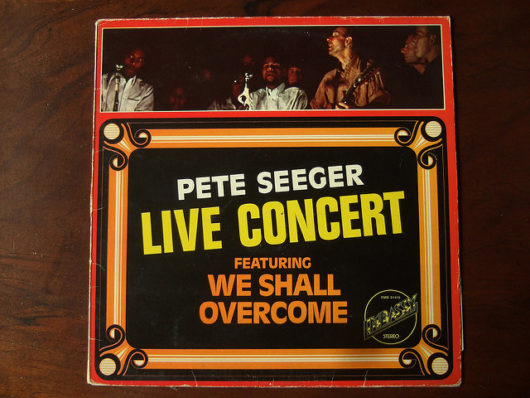Top 10 Civil Rights Songs

Music has an undeniable connection to civil rights movements. As Gregory Harper, a former museum director and archaeologist turned musician says, music has often been used in the service of civil rights and political awareness. Songs were chosen based on the influence in specific civil rights movements, as well as their popularity and legacies. In the text below, the top 10 civil rights songs are presented, but due to their importance and quality, they can be deemed as the top 10 of the best songs ever recorded. They are listed in alphabetical order and there is no importance in their specific ranking.
Top 10 Civil Rights Songs
- “Glad to Be Gay”- Tom Robinson Band. Written for a London gay pride parade, “Glad to Be Gay” was banned by the BBC upon its release. It became an anthem for the LGBTQ community in London. Tom Robinson has said that “Glad to Be Gay” was about the non-conforming, from lesbians to transgenders. With this proud song, Tom Robinson gave a voice to the people that might have never had a voice before.
- “Free Nelson Mandela”- The Specials. “Free Nelson Mandela” was a Top 10 hit in the United Kingdom in 1984. The song became an anthem for the anti-apartheid movement for people outside of South Africa and forced the privileged, white populations of the West to become aware of the issues in South Africa. Undoubtedly, this song influenced the citizens of powerful nations to beg their leaders to aid the fight against apartheid in South Africa.
- “From Little Things, Big Things Grow”- Paul Kelly and Kev Carmody. Written by two Australian artists in the early 1990s, this song tells of the inspiring story of the Gurindji people and their struggle for land rights. The lyrics tell of the 1966 Wave Hill walk-off that was originally focused on poor working conditions and low wages. The walk-off turned into much more since eight years later, Australian Prime Minister Gough Whitlam gave these people their land back, igniting the Aboriginal land rights movement. Today, this song continues to symbolize the struggle for recognition of natives all over the world.
- “Mannenberg”- Abdullah Ibrahim. Released in 1974, “Mannenberg” combined South African-jazz with African-American jazz-rock fusion. The outcome was a song that South African blacks clung to as their own. The influence of this song in South Africa’s fight against apartheid, along with its mixture of cultures, solidifies it as one of the best civil rights songs.
- “People Get Ready”- Curtis Mayfield and The Impressions. Released in 1965 during the American Civil Rights Movement after Curtis Mayfield watched the March on Washington, this gospel song turned mainstream hit has been covered countless times by many artists.
- “Redemption Song”- Bob Marley. To pick Marley’s best civil rights song is difficult, but “Redemption Song”, that was released on Marley’s last studio album appropriately named “Uprising”, seems fitting. Using words from a 1937 speech of Marcus Garvey’s, Marley tells of physical and mental freedom, the hallmarks of all civil rights movements.
- “Strange Fruit”- Billie Holiday. The most popular version of the song is Billie Holiday’s version, a symbolic mosaic of the pain that black people have endured in the United States, selling one million copies in its first year. Originally written by Abel Meeropol in reaction to the infamous photograph of the lynching of Thomas Shipp and Abram Smith, 1999 Time Magazine named “Strange Fruit” the best song of the century.
- “Sunday Bloody Sunday”- U2. As Irish rock band U2 was gaining momentum, soon to become the biggest rock bands of their time, they used their platform to share a perspective on the Bloody Sunday massacre, incident that occured in 1972 in the area of Derry, Northern Ireland. In 2010, United Kingdom Prime Minister David Cameron apologized on behalf of his country for the incident. The progress that was made by the Northern Irish in order to receive such an apology could not have been done without U2’s true-life tale that told those all over the world about the violence that was done to the people of Northern Ireland.
- “We Shall Overcome”- Pete Seeger. In 2018, the song’s lyrics became part of the public domain which is appropriate as the lyrics have traced back to the 18th century as slaves would sing similar verses while working. Pete Seeger brought it to mainstream consciousness, after hearing a group of mostly black tobacco workers sing the song during a strike. Joan Baez sang the song during the March on Washington. President Johnson uttered the words “we shall overcome” in his defense of the Voting Rights Act. The song continues to be sung at countless global, civil rights protests.
- “Zombie”- Fela Kuti. In a rebuke of the Nigerian military’s violent tactics, Kuti wrote “Zombie”. The Nigerian army acted swiftly, noting the song’s message as well as Kuti’s influence on the poorer populations of Africa. They pillaged Kuti’s commune and threw his elderly mother out of a window, resulting in her death. Kuti did not stop making music, symbolizing the resilience of those he gave a voice to. The legacy of “Zombie”, as well as the direct influence Kuti had in promoting civil rights, make this one of the best civil rights songs.
These songs listed above are masterpieces, but it is the people’s emotional connection to them what makes them even more valuable. They are directly connected to fight for human rights and will be surely used in the future as well.
– Kurt Thiele
Photo: Flickr
